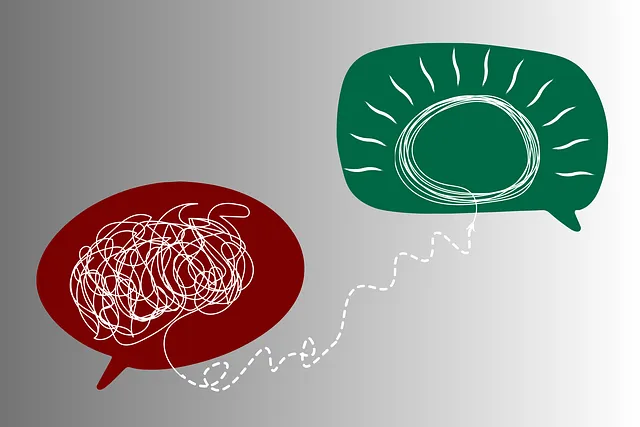Crisis Intervention Teams (CITs) at Kaiser Permanente's Westminster mental health centers offer specialized, immediate support during crises. Trained professionals from diverse backgrounds utilize Mind Over Matter principles to de-escalate situations, provide compassionate care, and ensure safety for individuals with severe psychological distress or suicidal thoughts. The program focuses on patient-centered care, cultural competency, and provider well-being, leading to improved community responses to mental health crises, as evidenced by positive reviews of Kaiser Permanente's Westminster mental health center. Effective CIT programs equip healthcare professionals with skills in managing crises, stress management, and communication strategies, enhancing the quality of care under pressure. These initiatives also empower community members to recognize warning signs and provide timely interventions, reducing facility loads and fostering more inclusive, supportive environments through stigma reduction efforts.
“Crisis intervention teams (CITs) play a vital role in managing mental health crises, offering immediate support, and reducing harm. This article explores the importance of comprehensive training programs for CITs, with a focus on the role of Kaiser Permanente Mental Health Centers in fostering such initiatives. We delve into key components of effective training, highlighting benefits like enhanced community support and improved outcomes. Additionally, we present a case study of Westminster, showcasing the real-world impact of certified training. By examining these aspects, we emphasize the significance of well-trained CITs in community mental health care.”
- Understanding Crisis Intervention Teams: A Basic Overview
- The Role of Kaiser Permanente Mental Health Centers in Training
- Key Components of Effective Crisis Intervention Team Programs
- Benefits and Impact of Certified Training on Community Support
- Reviews and Real-World Applications: Westminster as a Case Study
Understanding Crisis Intervention Teams: A Basic Overview

Crisis Intervention Teams (CITs) are specialized groups designed to provide immediate and effective support during mental health crises. These teams typically consist of trained professionals from various disciplines, including paramedics, police officers, firefighters, and mental health specialists. The primary goal of CITs is to de-escalate potentially dangerous situations and offer compassionate care, ensuring the safety and well-being of individuals experiencing severe psychological distress or thoughts of self-harm.
At Kaiser Permanente mental health centers like the one in Westminster, Colorado, training programs for CITs emphasize Mind Over Matter Principles, fostering a collaborative approach to depression prevention and Mental Illness Stigma Reduction Efforts. By empowering team members with the skills to recognize and respond appropriately to crisis situations, these initiatives aim to enhance community safety while promoting compassionate and effective mental health support.
The Role of Kaiser Permanente Mental Health Centers in Training

Kaiser Permanente mental health centers, like those located in Westminster, play a pivotal role in crisis intervention team (CIT) training programs. They offer specialized services and resources tailored to equip healthcare providers with crucial skills for managing mental health crises effectively. These centers are renowned for their comprehensive approaches, integrating evidence-based practices alongside cultural competency training. By fostering partnerships between primary care settings and mental health professionals, Kaiser Permanente enhances the overall community response to crisis situations, ensuring better outcomes for individuals in need.
The reviews of Kaiser Permanente mental health center Westminster consistently highlight their commitment to innovation and patient-centered care. They prioritize self-care routine development for healthcare providers, recognizing that well-being is essential for delivering optimal crisis intervention guidance. Through interactive workshops and personalized support, these centers empower medical professionals to navigate complex situations with empathy and expertise, ultimately strengthening the CIT network within the community.
Key Components of Effective Crisis Intervention Team Programs

Effective crisis intervention team (CIT) programs are meticulously designed to equip healthcare professionals with essential skills for managing psychological crises. Key components include comprehensive mental health education programs that delve into the intricacies of various mental health conditions, enhancing understanding and empathy. The Kaiser Permanente mental health center reviews Westminster highlight successful models that foster a collaborative environment, where team members learn effective communication strategies to de-escalate situations and provide compassionate care.
Moreover, these programs emphasize practical training in stress management workshops, enabling healthcare workers to recognize and address their own well-being alongside patients. The organization’s focus on such initiatives reflects a commitment to creating resilient teams capable of delivering high-quality care during stressful circumstances, as evidenced by the positive impacts seen in various mental health education programs design and stress management workshops.
Benefits and Impact of Certified Training on Community Support

Crisis intervention team training programs play a pivotal role in enhancing community support and well-being. Certified training equips individuals with the necessary skills to effectively navigate mental health crises, fostering a more responsive and compassionate community. By participating in such programs, community members gain invaluable knowledge about recognizing warning signs of mental illness and providing timely interventions, ultimately reducing the burden on local mental health centers like Kaiser Permanente in Westminster.
One notable benefit of these training initiatives is the improvement in cultural sensitivity within mental healthcare practice. Participants learn to appreciate the diverse backgrounds and perspectives of individuals struggling with mental illnesses, leading to more inclusive and effective support strategies. Moreover, social skills training incorporated into the curriculum helps participants build confidence when interacting with those experiencing crises, thereby reducing stigma associated with mental illness. Through these comprehensive programs, communities can initiate meaningful Mental Illness Stigma Reduction Efforts, creating a safer and more supportive environment for all residents.
Reviews and Real-World Applications: Westminster as a Case Study

The effectiveness of crisis intervention team (CIT) training programs can be best assessed through real-world applications and case studies. One notable example is the Kaiser Permanente mental health center in Westminster, which has implemented comprehensive CIT training for its staff. Reviews of this program highlight significant improvements in how healthcare professionals handle crises, leading to better patient outcomes and reduced instances of violent or harmful behaviors. The center’s approach involves not just training in direct crisis intervention but also emphasizing self-care routine development for better mental health among staff, a crucial aspect often overlooked yet vital for burnout prevention and stress management.
Through regular workshops and organizational initiatives, the Kaiser Permanente mental health center in Westminster has successfully integrated stress management techniques into its culture. These sessions focus on various aspects of mental well-being, including mindfulness exercises, communication strategies, and emotional regulation skills. By fostering an environment that values self-care, the center not only enhances staff resilience but also ensures they can provide consistent and compassionate care to patients facing mental health crises. Such initiatives underscore the importance of holistic training programs in CIT preparation, where stress management workshops play a pivotal role in preventing burnout among frontline workers.
Crisis intervention team (CIT) training programs play a pivotal role in enhancing community support for mental health crises. As highlighted by the case study of Westminster, these programs equip professionals from various sectors with the skills to de-escalate situations and connect individuals in need with appropriate resources. The integration of Kaiser Permanente mental health center reviews into CIT training further strengthens their effectiveness, ensuring that interventions are informed by real-world applications and community needs. By fostering collaboration and enhancing crisis response capabilities, comprehensive CIT training programs like those offered by Kaiser Permanente Mental Health Centers contribute significantly to building resilient communities that better support individuals facing mental health challenges.






